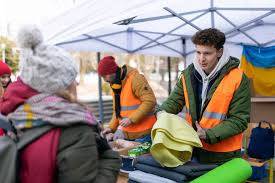**Slovakia Threatens to Cut Benefits for Ukrainians Amid Escalating Dispute Over Russian Gas Transit**
A growing rift between Slovakia and Ukraine over Russian natural gas transit has taken a sharp turn, with Slovak officials threatening to reduce or eliminate benefits for Ukrainian refugees. This development marks a significant escalation in tensions between the two nations, which have historically shared close ties due to their geographical and cultural proximity.
### The Gas Transit Dispute
The dispute centers around Slovakia’s reliance on Russian natural gas and the role Ukraine plays as a transit country. Slovakia, like many Central European nations, has long depended on Russian energy supplies delivered through Ukraine's pipelines. However, the dynamics have shifted dramatically since Russia’s full-scale invasion of Ukraine in February 2022.
In response to the invasion, the European Union (EU) has sought to reduce its dependence on Russian energy, leading to a restructuring of energy flows across the continent. Slovakia, a member of the EU, has faced significant challenges in diversifying its energy sources. Meanwhile, Ukraine’s role as a transit country has diminished, particularly as Russian gas exports have been redirected or cut off in retaliation against Western sanctions.
Recent negotiations between Slovakia and Ukraine over transit fees and pipeline usage have reportedly broken down. Slovak officials accuse Ukraine of demanding exorbitant fees and leveraging its position to pressure neighboring countries. Ukrainian authorities, in turn, argue that they are bearing the brunt of Russia’s aggression and need financial support from transit fees to sustain their economy and war effort.
### The Threat to Refugee Benefits
As tensions mount, Slovakia has indicated it may reduce or completely cut social benefits provided to Ukrainian refugees residing in the country. Since the onset of the war, Slovakia has welcomed tens of thousands of Ukrainians fleeing the conflict, offering them shelter, financial assistance, and access to healthcare and education.
Slovak Prime Minister Robert Fico, known for his populist and pro-Russian rhetoric, has been vocal about his dissatisfaction with the current arrangement. “Slovakia has done more than its fair share to support Ukraine and its people,†Fico stated in a recent press conference. “But we cannot allow our generosity to be taken for granted, especially when our own citizens are struggling with rising energy costs and economic uncertainty.â€
The proposed cuts to refugee benefits have drawn sharp criticism from humanitarian organizations and opposition parties in Slovakia. Critics argue that targeting vulnerable refugees is not only morally wrong but also risks damaging Slovakia’s international reputation and its standing within the EU.
### Ukrainian Response
Ukraine has condemned Slovakia’s threats as a politically motivated tactic designed to pressure Kyiv in the ongoing gas transit dispute. Ukrainian Foreign Minister Dmytro Kuleba called the move “an unacceptable exploitation of human suffering for political gain.â€
“Ukrainian refugees are victims of Russian aggression,†Kuleba said in a televised address. “They should not be used as pawns in a dispute that ultimately benefits Russia by dividing our nations and weakening European unity.â€
Ukrainian officials have urged the EU to intervene, calling for a unified approach to energy policy and refugee support. They argue that Slovakia’s actions could set a dangerous precedent, encouraging other countries to adopt similarly punitive measures against Ukrainian refugees.
### Broader Implications
The escalating dispute highlights the complex interplay of geopolitics, energy policy, and humanitarian considerations in Europe’s response to the war in Ukraine. Slovakia’s reliance on Russian gas underscores the challenges many EU countries face as they seek to transition away from fossil fuels and reduce their vulnerability to geopolitical pressures.
At the same time, the potential cuts to refugee benefits raise questions about the sustainability of Europe’s support for Ukraine and its people. While the EU has demonstrated remarkable solidarity in providing military and financial aid to Ukraine, the strain on individual member states is becoming increasingly apparent.
In Slovakia, public opinion is divided. Many Slovaks sympathize with Ukraine and view their support for refugees as a moral obligation. However, a growing segment of the population is expressing frustration over rising living costs and the perceived prioritization of refugees over domestic issues. This sentiment has been amplified by Fico’s government, which has capitalized on economic anxieties to bolster its populist agenda.
### EU and International Response
The European Union has expressed concern over the escalating tensions between Slovakia and Ukraine. A spokesperson for the European Commission emphasized the importance of unity among member states and called for a diplomatic resolution to the gas transit dispute. “The EU stands firmly with Ukraine and its people in the face of Russian aggression,†the spokesperson said. “We urge Slovakia and Ukraine to work together in good faith to resolve their differences.â€
International organizations, including the United Nations and Amnesty International, have also weighed in, urging Slovakia to uphold its commitments to refugee protection. Cutting benefits, they argue, would violate international norms and undermine the principles of solidarity and compassion that have defined Europe’s response to the Ukrainian crisis.
### What’s Next?
The outcome of the Slovakia-Ukraine dispute remains uncertain, but its implications are far-reaching. For Slovakia, the decision to cut benefits for Ukrainian refugees could have lasting consequences for its domestic politics, international relationships, and social cohesion. For Ukraine, the dispute underscores the challenges of maintaining regional solidarity amid a protracted and brutal conflict.
As the situation unfolds, all eyes will be on the EU and its ability to mediate between the two countries. The bloc’s response will be a test of its commitment to unity and its capacity to address the complex challenges arising from the war in Ukraine.


